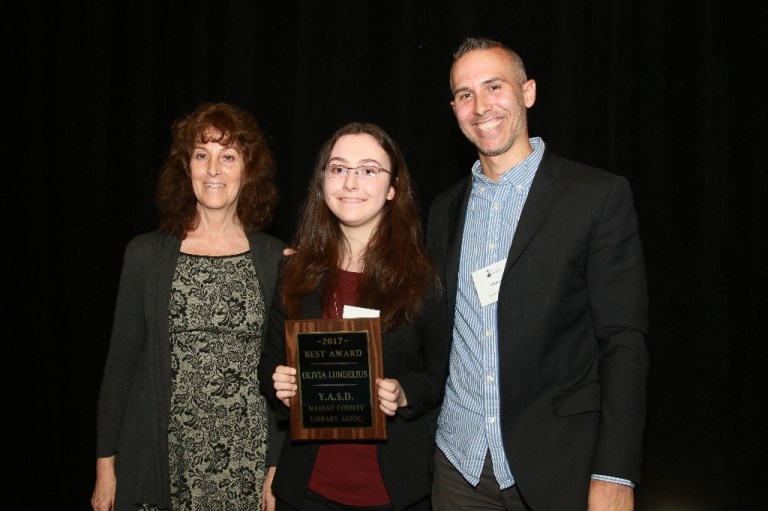
Olivia Lundelius, a senior at Great Neck South High School, helped pioneer classes in Java, Python and Android app making at the Great Neck Library. Her work won her the Nassau County B.E.S.T. (or Bringing Excellence Service by Teens) award, which is given out by the Nassau County Library Association.
Adam Hinz, the coordinator for youth services at the Great Neck Library, said that it did not have too many technology programs. In fact, he went to her about starting the classes to help keep the library relevant.
“The current director of Levels approached me and asked if I was interested in teaching a course while I was at a Python course that was organized through Levels. I thought he was crazy at first, but I thought, eh, OK, why not,” Lundelius recalled.
At the time, Lundelius was a junior in high school, but she had frequently attended Levels, a supervised teen center of the Great Neck Library, since around eighth or ninth grade.
“On Levels, we have a lot of arts based programs. We didn’t have a ton of technology, even though that was her main interest,” Hinz said.
Hinz said Lundelius was as reliable as any library professional would be. Lundelius would arrive early, often email ahead, check which operating systems students had so she could accommodate them and make in-depth lesson plans, he said.
Hinz also recalled when Levels was temporarily based in Saddle Rock Elementary School as renovations unfolded at the main library. He said there was no wireless signal, so she downloaded Java onto flash drives in advance.
“She was incredibly self-reliant and I knew this was something I was not going to have to worry about,” Hinz said. “She was sort of bullet-proof all the way along.”
But computer science is not her only love. Lundelius recalled days where her grandfather, a paleontologist, took her to the Vertebrae Paleontology Laboratory in Austin, Texas. There she helped separate microfossils from concentrate, which she described as an exhausting process.
“Before it can be analyzed, the microfossils need to be separated and that’s a long and boring task,” Lundelius said. “So hopefully I can help create some kind of machine that will sort it automatically, so that they don’t have to waste so much time sorting it.”
Both her interest in paleontology and computer science played a part developing a project that earned national accolades in competitions like the WAC Lighting Fair and Regeneron Science Talent Search.
Her device sources RGB color levels and data to effectively separate the microfossil from granite, allowing for easier and quicker analysis.
“I always knew I wanted to go into some kind of science because my family is very much interested in the natural sciences and nature and paleontology,” Lundelius said.
After graduation, Lundelius will go to Rensselaer Polytechnic Institute, a private research university, to study computer science. From there, she hopes to secure her graduate degrees and get into research.
“Computer science as a field itself is really, really cool,” Lundelius said, “but I’m very interested in how it can be used in other places.”






